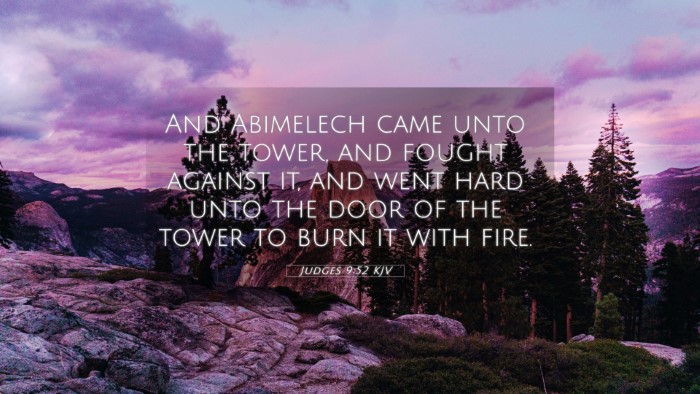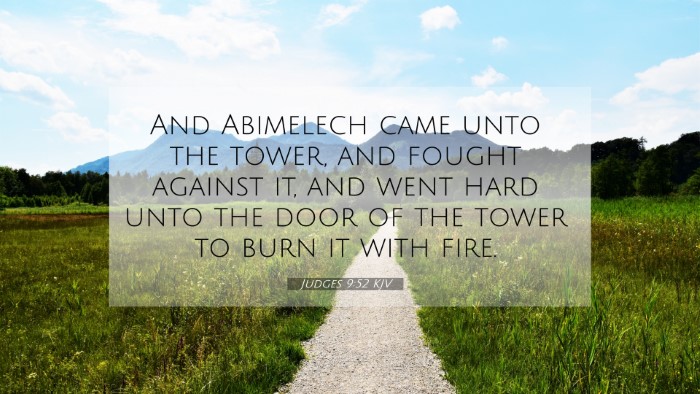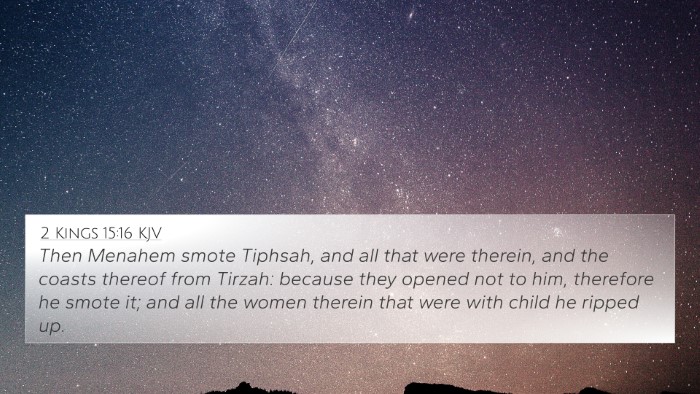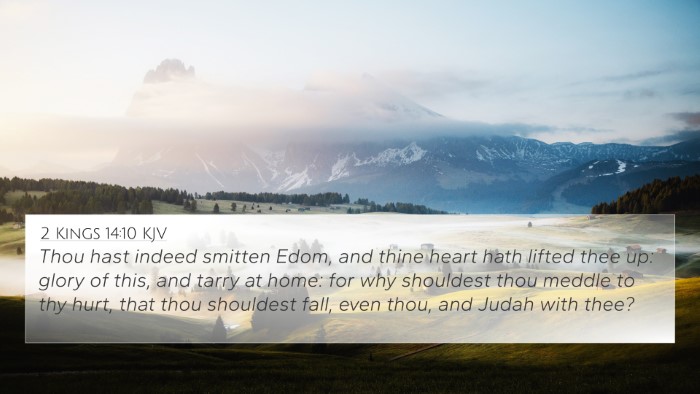Understanding Judges 9:52
Judges 9:52 (KJV): "And Abimelech came unto the tower, and fought against it, and went hard unto the door of the tower to burn it with fire."
This verse narrates an intense moment in the life of Abimelech, who pursued his enemies. To understand the full context and significance of this verse, we can draw on insights from various public domain commentaries, including those by Matthew Henry, Albert Barnes, and Adam Clarke.
Contextual Analysis
The verse occurs in a broader narrative that discusses Abimelech's ambitions and his violent rise to power. Abimelech, son of Gideon, seeks to consolidate his authority, and his attack on the tower implies a greater struggle between leadership and rebellion.
Matthew Henry's Commentary Insights
According to Matthew Henry, the actions of Abimelech exemplify the consequences of unchecked ambition and the nature of oppressive rule. Henry emphasizes that this event reflects the divine judgment upon Abimelech, as he is ultimately destroyed by his own wickedness.
Albert Barnes' Perspective
Albert Barnes points out that the 'tower' symbolizes refuge and security. Abimelech's assault on the tower represents his ruthless pursuit of power, putting all who had taken refuge within in danger. Barnes also notes the hollow nature of Abimelech's victory; despite his outward power, he stands against the people of God.
Adam Clarke's Interpretation
Adam Clarke adds that this verse showcases the fate of those who oppose God’s chosen leadership. Clarke's reflections indicate that Abimelech's actions lead to a swift downfall, which serves as a warning against rebellion and disobedience to the divine order.
Key Themes and Lessons
- The Dangers of Ambition: The narrative warns against pursuing power at the expense of morality and righteousness.
- Divine Judgment: Abimelech's actions reflect a greater spiritual truth, which is that leaders who act unjustly face divine repercussions.
- The Fragility of Human Efforts: Though Abimelech appeared powerful, his endeavors were ultimately futile without divine favor.
- Symbol of Refuge: Towers often symbolize safety in biblical texts; thus, Abimelech's attack on such a stronghold speaks to the assault on sanctity and divine protection.
Bible Verse Cross-References
This verse connects deeply with several other scriptures, enhancing its meaning through inter-biblical dialogue:
- Judges 8:23-24: Gideon's refusal to be king foreshadows Abimelech's rise and eventual tragic downfall.
- 2 Samuel 20:15: The siege at Abel reflects similar themes of conflict in fortified places.
- Isaiah 10:1-4: A parallel on the consequences of tyranny and injustice against God's people.
- Proverbs 16:18: "Pride goes before destruction," exemplified in Abimelech's character.
- Matthew 7:26-27: The foolish man’s house built on sand mirrors Abimelech's unstable reign.
- Revelation 6:8: Themes of death and destruction resonate with Abimelech's violent pursuits.
- Galatians 6:7: "For whatever a man sows, that he will also reap," which underscores the moral law present in Abimelech's story.
Tools for Bible Cross-Referencing
Understanding the connections between Bible verses can enhance study and interpretation. Below are some suggested tools:
- Bible Concordance: A vital resource for finding keywords and exploring thematic links.
- Bible Cross-Reference Guide: A helpful tool for discovering related scriptures and their contexts.
- Cross-Reference Bible Study: Methods for deeper exploration of themes across the Bible.
- Bible Reference Resources: Various materials that aid in understanding scriptural ties.
Conclusion
Judges 9:52 illustrates the complex interplay of ambition, power, and divine judgment through the character of Abimelech. Each commentary provides insights that guide us in understanding the narrative’s moral implications and thematic connections with other Scriptures. Engaging in comparative Bible verse analysis and utilizing available Bible cross-reference tools allows us to glean greater wisdom from God's Word, reinforcing how interconnected the Holy Scriptures truly are.





